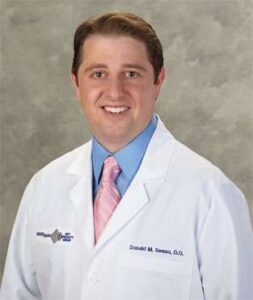4 Treatments for Sleep Apnea that Don’t Involve Surgery or a CPAP Machine
Obstructive sleep apnea (OSA) is a problem. Although it is quite a noisy problem – all that snoring and gasping – the complications it...
Posted on January 29, 2020
Sleep ApneaAn estimated 22 million Americans suffer from sleep apnea with a large proportion of these going dangerously undiagnosed. Diseases associated with sleep apnea are diabetes, cardiovascular disease and stroke, even mental illness and death.
The premise has long been that obesity presented the strongest risk factor, with overweight and obese individuals accounting for over 70% of sleep apnea cases. As a result, interventions such as weight loss and CPAP machines (continuous positive airway pressure) have been regularly advocated.
Recently, a 7-year study performed by sleep scientists at the University of Pennsylvania demonstrated that general weight loss reduced the volume of soft tissue around the throat and mouth (specifically the tongue), and this reduction of fat corresponded to an improvement in sleep apnea.
“The Penn study emphasizes an important issue that sleep surgeons have known for years,” says Dr. Donald M. Sesso, Philadelphia’s “sleep doctor” and the only triple board-certified sleep surgeon in the Tri-state area. “If doctors don’t recognize or have the ability to treat tongue base obstruction, they may not be able to “cure” or alleviate sleep apnea with surgery. I have heard many times from patients and colleagues that sleep apnea surgery doesn’t work. I would strongly challenge that assertion. In my opinion, the reason that patients may still have persistent sleep apnea after throat and/or nasal surgery is a failure to recognize tongue base obstruction. That is why we stress a complete anatomic examination of all sleep apnea patients. It’s rather simple and just takes a few minutes in the office.”
Dr. Sesso offers three reasons that patients should have their airways evaluated:
Dr. Sesso says that “the idea of excess fat or soft tissue in the tongue is not new. In fact, my mentors at Stanford University pioneered radiofrequency surgery years ago to reduce the volume of the tongue. In addition, I have seen many patients undergo weight loss surgery (bariatric surgery) which resolved their weight issue and sleep apnea.”
“I have always been an advocate of weight loss. In fact, I instruct my patients that weight loss will only help their sleep apnea, and, in certain cases, alleviate it. Conversely, weight gain can cause a progression or recurrence of sleep apnea. Furthermore, there have been many studies to show that obese patients with severe sleep apnea can still have significant apneic episodes even after weight loss surgery. I commend Penn on this finding.”
“I would also stress several take-home points for patients. If you have sleep apnea, it is an important part of your treatment protocol to have your airway evaluated. Weight loss is an important part of the treatment protocol. Lastly, if you have sleep apnea and have experienced significant weight loss, you should consider repeat sleep testing/evaluation to make sure that the sleep apnea is truly resolved.”
 Dr. Donald M. Sesso, D.O., board certified in Otolaryngology and Sleep Medicine, is the only fellowship-trained sleep surgeon in the Tri-state area. He is widely known as Philadelphia’s snoring doctor.
Dr. Donald M. Sesso, D.O., board certified in Otolaryngology and Sleep Medicine, is the only fellowship-trained sleep surgeon in the Tri-state area. He is widely known as Philadelphia’s snoring doctor.
Treating both adults and children, Dr. Sesso is trained in all aspects of otolaryngology and specializes in sleep disorders, the surgical treatment of obstructive sleep apnea (OSA), and advanced endoscopic sinus surgery and allergies.
He is a member of the American Academy of Otolaryngology, American Osteopathic Association and American Academy of Sleep Medicine.
Obstructive sleep apnea (OSA) is a problem. Although it is quite a noisy problem – all that snoring and gasping – the complications it...
Face it, no one likes a snorer. You may have an outstanding personality, but snoring is not typically considered a desirable trait in a...
Snoring – that raspy, snorty, rattly, overall-somewhat-unpleasant noise emanating from your partner’s open mouth as they sleep (and while you don’t sleep). Though most...
As it turns out, everything is connected in the human body. The thigh bone is connected to the hip bone, the heart is connected...